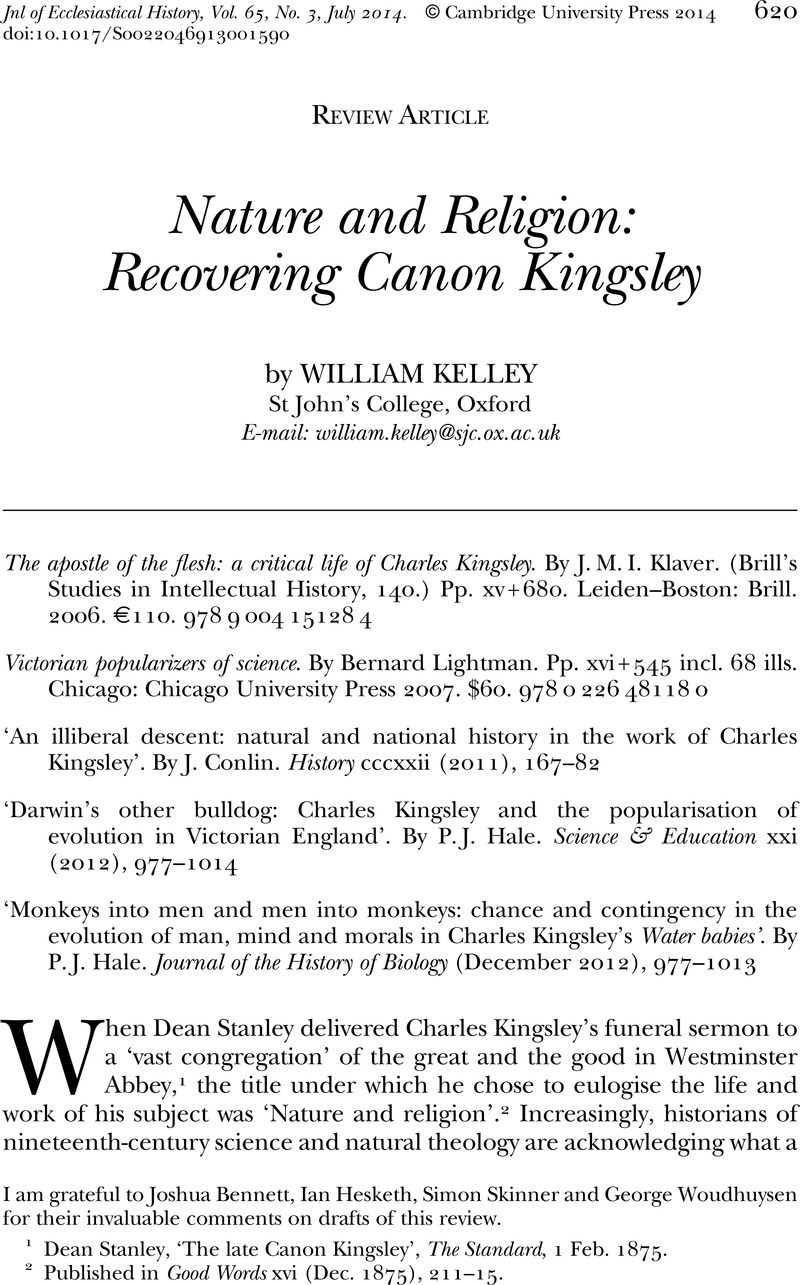Published online by Cambridge University Press: 12 June 2014

1 Dean Stanley, ‘The late Canon Kingsley’, The Standard, 1 Feb. 1875.
2 Published in Good Words xvi (Dec. 1875), 211–15.
3 Kingsley, F. E. (ed.), Charles Kingsley: his letters and memories of his life, Cambridge 2011Google Scholar.
4 Klaver, , The apostle of the flesh, 352Google Scholar.
5 Ibid. 369.
6 Ibid. 474–5.
7 Desmond, A., Huxley, from devil's disciple to evolution's high priest, London 1998Google Scholar.
8 Lightman, , Victorian popularizers of science, p. ixGoogle Scholar.
9 Ibid.
10 Ibid. 42.
11 Ibid. 74.
12 Ibid. 490–1.
13 Bunbury, F. J. (ed.), Life, letters and journals of Sir Charles J. F. Bunbury, iii. 21Google Scholar. This sermon was printed as the sixteenth sermon in Kingsley, Charles, Westminster sermons, London 1874Google Scholar.
14 Hale, ‘Darwin's other bulldog’, 982–3.
15 Ibid. 979, 1001.
16 Ibid. 992.
17 Ibid. 993.
18 Ibid. 1002–3.
19 Secord, James, ‘How scientific conversation became shop talk’, Transactions of the Royal Historical Society xvii (2007), 129–56Google Scholar, and Victorian sensation, Chicago 2000; Alberti, Samuel, ‘Conversaziones and the experience of science in Victorian England’, Journal of Victorian Culture viii (2003), 208–30Google Scholar.
20 Hale, ‘Darwin's other bulldog’, 1000.
21 Ibid. 1009.
22 Ibid. 998.
23 Ibid. 997–8.
24 Ibid. 981.
25 C. Kingsley, Westminster sermons, p. v.
26 Hale, ‘Monkeys into men’, 977.
27 F. Kingsley, Letters and memories, ii. 171.
28 Beer, G., Darwin's plots, 3rd edn, Cambridge 2009, 123–9Google Scholar.
29 F. Kingsley, Letters and memories, ii. 137–8.
30 Kingsley, C., ‘President's address’, Report and transactions of the Devonshire Association for the Advancement of Science, Literature and Art (1871), 386Google Scholar.
31 Conlin, ‘Illiberal descent’, 167 (abstract).
32 Ibid. 169.
33 Ibid. 187.
34 Elton, G. R., The history of England: inaugural lecture delivered 26 January 1984, Cambridge 1984, 2Google Scholar.
35 Kingsley, C., Three lectures […] on the ancien regime, London 1867, 135Google Scholar.
36 Idem, The Roman and the Teuton, 2nd edn, London 1889, 337–8.
37 Arnold, T., ‘On the social progress of states’, in Miscellaneous works, London 1845, 81Google Scholar.
38 Forbes, D., The Liberal Anglican idea of history, Cambridge 1952, 15–20Google Scholar.
39 Ibid. 35–6.
40 C. Kingsley, Roman and Teuton, 6.
41 Ibid. 5.
42 Arnold, T.to the Revd J. Tucker, 2 Mar. 1828, in Stanley, A. P. (ed.), The life and correspondence of Thomas Arnold D. D., 6th edn, London 1846Google Scholar, 68.
43 Kingsley, C., Hypatia: new foes with an old face, London 1883, 47Google Scholar.
44 Conlin, ‘Illiberal descent’, 170. We should also note the debt analogies of this kind may have owed to comparative philology. See Burrow, J. W., ‘The uses of philology in Victorian England’, in Robson, Robert (ed.), Ideas and institutions of Victorian Britain, New York 1967, 180–204Google Scholar.
45 [C. Kingsley], ‘Bible politics vi’, The Christian Socialist, 15 Mar. 1851.
46 Idem, Roman and Teuton, 338.
47 Reprinted in idem, ‘The natural theology of the future’, in Scientific lectures and essays, London 1880, 323–4.
48 Ibid. 324.
49 Idem, Roman and Teuton, 12, 305.
50 Ibid. 65, 111, 247, 248ff.
51 Idem, Hereward the Wake, London 1867, 6.
52 Ibid. 19.
53 Ibid. 5.
54 Conlin, ‘Illiberal descent’, 186.
55 Ibid. nn. 98, 99.
56 Ibid. 186–7, citing Goldwin Smith, ‘The greatness of the Romans’, in Lectures and essays, New York 1881, 1–20 at pp. 2–3.
57 Goldwin Smith, ‘The greatness of the Romans’, 3.